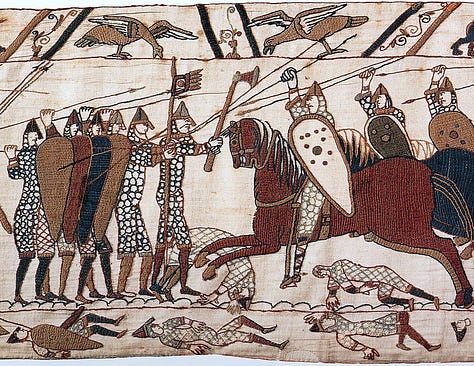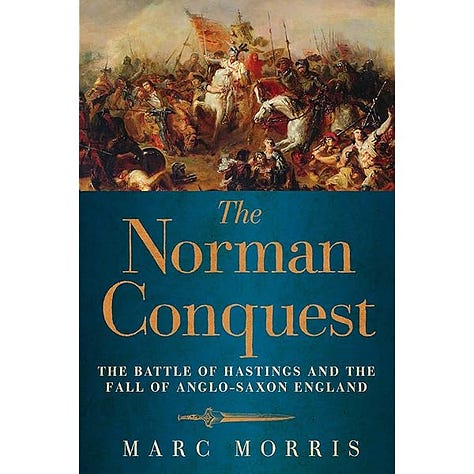A mild spin on this whole modern ‘nationalism’ versus medieval reality thing.
In 1067, only a year after Hastings, two of the late King Harold’s sons landed in Somerset with a fleet from Ireland. They tried to storm Bristol, but were driven off by the citizens. The invaders returned to their ships and sailed up the Avon to ravage Somerset.
If this was an attempt to liberate England from the Norman Yoke, Harold’s boys had a funny way of going about it. They were confronted at Bleadon by the local fyrd, led by an Anglo-Saxon noble named Eadnoth the Staller. He had been a powerful man under Edward the Confessor and Harold, holding thirty manors in Devon, Dorset, Somerset and Wiltshire. His title of ‘staller’ referred to a high-ranking royal officer, translated in one version of the Anglo-Saxon Chronicle as ‘master of horse’.
A battle was fought, in which Eadnoth was killed along with many men on both sides. Although the fight had ended in a bloody draw, the invaders were so decimated they had to retreat to their ships and sail back to Ireland.
Eadnoth’s son, Harding, became Sheriff of Bristol under the first two Williams and Henry I. His grandson Robert FitzHarding was a powerful noble at the court of Henry II, and the family continued to prosper well into the medieval era. Hardly anyone remembers the Battle of Bleadon, strangely.
Eadnoth is an interesting example of as English landholder who supported the Normans. Some may call him a traitor and collaborator, but he was not alone in resisting the Godwinssons. Whatever he thought of Harold, the late king’s sons were simply pirates, who came to England to kill and plunder. To judge from the reaction of the fyrd - local men, whose homes and families were under threat - they felt the same way.
Other notable English survivors of the conquest include Edward of Salisbury, Sheriff of Wiltshire, also called Edward the Rich. Of the thirteen English tenants-in-chief who still held land in 1086, his name is at the top of the list. His younger son, another Edward, fought as Henry I’s standard bearer at the battle of Bremule in 1119. Orderic Vitalis describes him thus:
“Edward of Salisbury, a brave champion renowned for his proven valour, who remained steadfast until his death, carried the standard there.”
Like other English survivors, Edward's family married into the Norman aristocracy. His grandson was Patrick 1st Earl of Salisbury and uncle to William Marshal (the famous one).
These families were not typical, of course: there was still massive dispossession and appropriation post-1066, and nobody can deny that. Even so, there are nuances. Within a few years of Bleadon, William felt secure enough to take a virtually all-English army to fight his enemies overseas. While fighting in Normandy, his life was saved by an English thegn. I can bore on about that if people like, or not if they don’t.






